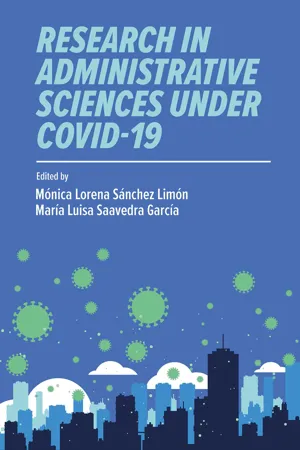
Research in Administrative Sciences under COVID-19
- 288 pages
- English
- ePUB (mobile friendly)
- Available on iOS & Android
Research in Administrative Sciences under COVID-19
About this book
Due to the COVID-19 pandemic the entire world experienced a health, humanitarian, and economic crisis with no record in the present century, leading to the paralysis of activities by voluntary or mandatory quarantines. There is great uncertainty about how long the crisis will last and how recovery will be achieved, because of this paralysis and the contraction of demand, auguring a slow recovery.
Research in Administrative Sciences under COVID-19 examines the context surrounding organizations in the face of the COVID-19 Pandemic. Detailing various aspects related to companies and their competitiveness in the face of the global health crisis, chapters cover topics on intellectual capital, burnout (professional exhaustion), stress and technostress, as well as pandemic effects on the human capital of organizations. Developing upon the issues of Corporate Social Responsibility, E-commerce in times of COVID-19 and Design Thinking as a strategy for the economic reactivation of start-ups in Mexico, this volume is the result of research efforts carried out by 23 outstanding researchers from 12 Mexican and Latin American higher education institutions.
Tools to learn more effectively

Saving Books

Keyword Search

Annotating Text

Listen to it instead
Information
Part I
Companies and SMEs
Chapter 1
The Systemic Competitiveness of Latin American MSMEs Under COVID-19
Abstract
Introduction
1.1. Theoretical Framework
1.1.1. The Systemic Competitiveness Model
1.2. Method
Table of contents
- Cover
- Title
- Introduction
- Part I. Companies and SMEs
- Part II. Human Capital and Knowledge Management
- Part III. Marketing and Business Strategies
- Index
Frequently asked questions
- Essential is ideal for learners and professionals who enjoy exploring a wide range of subjects. Access the Essential Library with 800,000+ trusted titles and best-sellers across business, personal growth, and the humanities. Includes unlimited reading time and Standard Read Aloud voice.
- Complete: Perfect for advanced learners and researchers needing full, unrestricted access. Unlock 1.4M+ books across hundreds of subjects, including academic and specialized titles. The Complete Plan also includes advanced features like Premium Read Aloud and Research Assistant.
Please note we cannot support devices running on iOS 13 and Android 7 or earlier. Learn more about using the app